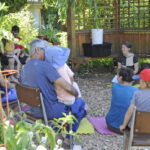
We offer a variety of programming for learners from preschool to grade 12. Book a workshop at our teaching garden, or have one of our educators come to you! Inquire about the possibility of French composting workshops for immersion classes from Kindergarten to grade 8!
Daycare, preschool, and kindergarten Grade 1 to grade 3 Grade 4 to grade 8 Grades 9 to grade 12 additional offerings
Follow Corey (a friendly apple core) and Brownie (a helpful leaf) in this interactive puppet show as they learn about “browns” and “greens” and how to make compost in a backyard bin. Students will engage through song, movement and play in this fun story-based workshop.
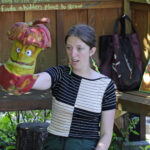
Learn the basics of composting by meeting fun puppets, and explore how red wriggler worms transform food waste into soil. Students will learn all about red wrigglers by creating a worm composting bin for your classroom to keep for continued learning! Follow up resources for educators are provided. Option to harvest your bin in part 2 of our workshop.
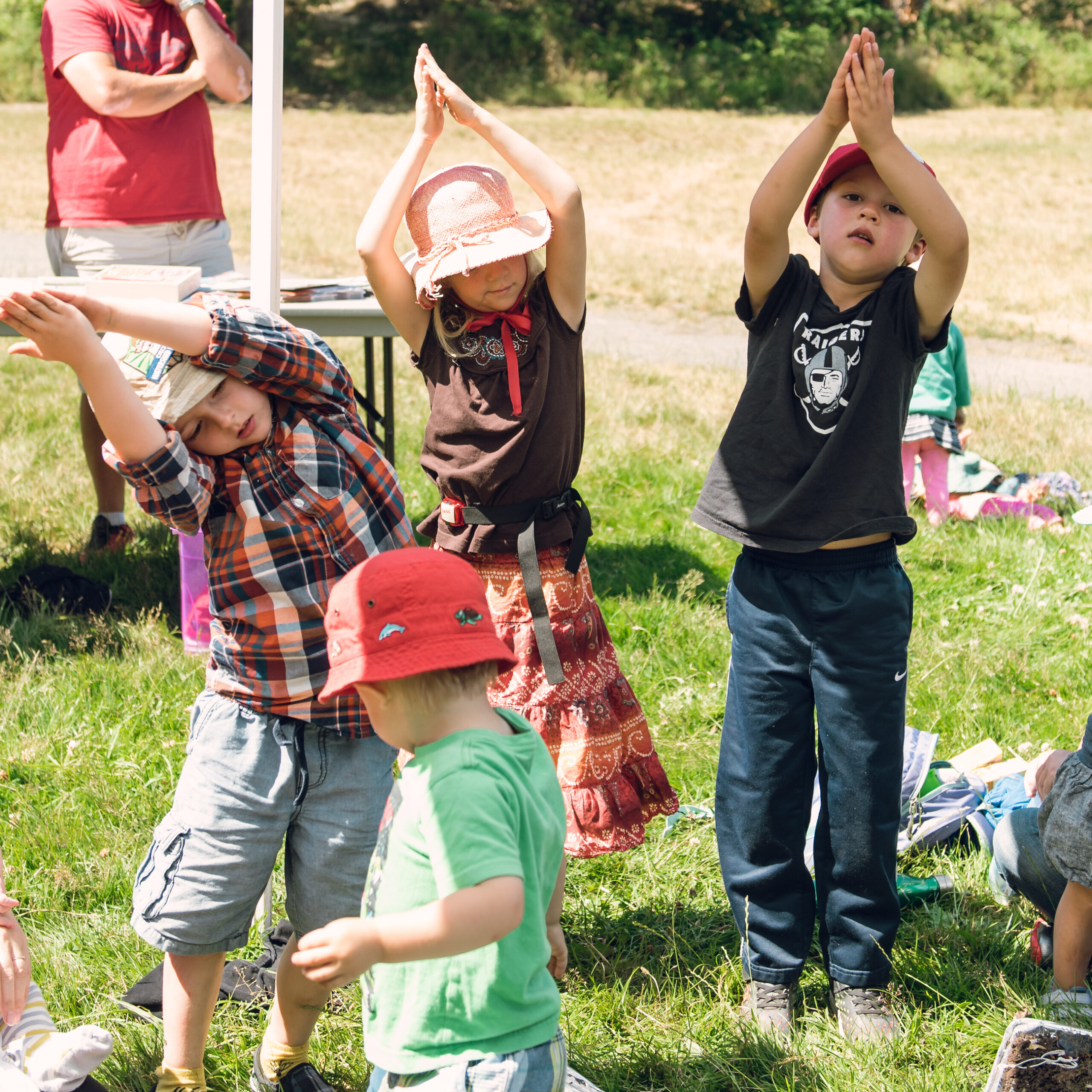
Why is soil so important? This discovery-based workshop explores soil and compost up close while making connections to the role we play in maintaining soil health. This lively workshop includes puppets, song and movement. Students will also get the chance to meet live worms and learn about the amazing work they do for the soil!

Why are seeds so amazing? Explore how the many shapes and sizes seeds come in help them travel, participate in a seed dissection to understand what’s going on inside of a seed, and how baby plants grow. Students get the opportunity to be creative and use their imagination and end by planting their own seeds!
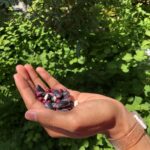
Explore the Compost Education Centre Teaching Gardens and Demonstration Site! Meet puppets, live worms and fish and learn about composting, growing food and sustainability through touch, taste and smell. This exploratory and interactive tour is action packed!
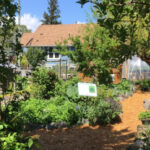
Has your worm bin come full cycle? Complete your students’ understanding of the compost cycle through an exploration of their finished compost! Students will get the chance to get up close and personal with their worms while discovering all the other critters that have been living with them in the bin! This lesson is hands on and filled with laughs.
*Note: Harvest workshops should be booked around 6 months after setting up the worm bin. The contents of the bin should look like soil and be a small particle size with little newspaper.
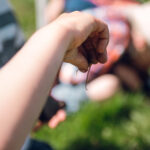
Join our friends Bumble (a buzzy bee), Beetie (a round beetle), and Horace (a beautiful hummingbird), on their pollination journey. This interactive story-based workshop delves into the importance of pollen and pollinators in our gardens, engaging participants through song, dance, and a colorful puppet show.
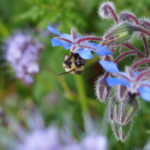
Learn the basics of composting by meeting fun puppets, and explore how red wriggler worms transform food waste into soil. Students will learn all about red wrigglers by creating a worm composting bin for your classroom to keep for continued learning! Follow up resources for educators are provided. Option to harvest your bin in part 2 of our workshop.
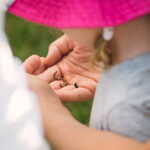
Why is soil so important? This discovery-based workshop explores soil and compost up close while making connections to the role we play in maintaining soil health. This lively workshop includes puppets, song and movement. Students will also get the chance to meet live worms and learn about the amazing work they do for the soil!
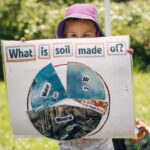
Why are seeds so amazing? Explore how the many shapes and sizes seeds come in help them travel, participate in a seed dissection to understand what’s going on inside of a seed, and how baby plants grow. Students get the opportunity to be creative and use their imagination and end by planting their own seeds!
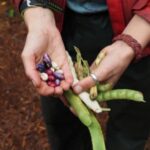
Complete your students’ understanding of the compost cycle through an exploration of their finished compost! Students will get the chance to get up close and personal with their worms while discovering all the other critters that have been living with them in the bin! This lesson is hands on and filled with laughs.
*Note: Harvest workshops should be booked around 6 months after setting up the worm bin. The contents of the bin should look like soil and be a small particle size with little newspaper.
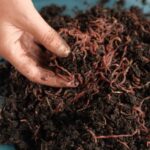
Explore the Compost Education Centre Teaching Gardens and Demonstration Site! Meet puppets, live worms and fish and learn about composting, growing food and sustainability through touch, taste and smell. This exploratory and interactive tour is action packed!
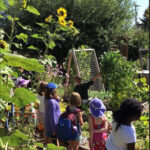
Explore the Compost Education Centre Teaching Gardens and Demonstration Site, with explorations of composting, native plants and pollinators, veggie gardens, aquaponics, and more. The tour offers inquiry-based education and applied learning, relating our gardens to the world surrounding the students.

Discover worms and the benefits of composting! Students will learn about the compost cycle and gain an understanding of worm anatomy while holding Red Wriggler worms. Putting their new knowledge to work, students will create a worm bin together to keep in your class for continued learning. Option to harvest your bin in part 2 of our workshop.
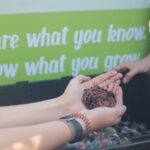
In this workshop students will dive into the world of soil. Hands-on, discovery-based activities encourage students to unearth the many things soil has to tell us and explore what it means to be a soil steward. Introduce your students to composting, soil ecology, erosion, conservation and more
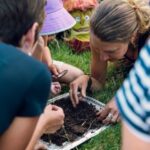
What is a pollinator? Why are bees so important? Learn about the importance of pollinators, explore little known facts about native bees and engage in hands on activity. Discover how to care for and protect native pollinators, and learn about their integral role in local ecosystems. This spring and summer workshop is jammed packed with new info and involves opportunity for lots of exploration.
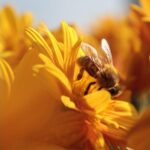
If your worm bin is starting to look like soil it may be time for a harvest! This follow up workshop revisits the compost recipe and worm anatomy through the exploration of the finished compost while removing worms. Students get the chance to solidify their knowledge on the compost cycle while uncovering plenty of new things about the food web in their compost bin.
*Note: Harvest workshops should be booked around 6 months after setting up the worm bin.
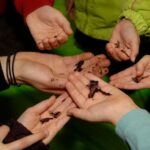
What is citizen science? How can we connect with the biodiversity in our neighbourhoods? In this workshop, students will conduct a biodiversity survey near their school, and learn how to publish the data they record using the iNaturalist platform. We will discuss the importance of citizen science as a tool for deepening our understanding of the world around us, as well as connecting with other nature enthusiasts and contributing to scientific research and stewardship.
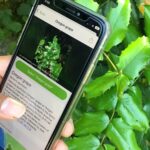
Why do seeds come in such different shapes and sizes? How do they know when to sprout? Why are many of them so nutritious? Find out in this workshop, where students will dissect beans to uncover their hidden anatomy, learn about seed adaptations by doing a slippery science experiment, collaboratively design their own seeds, and more!
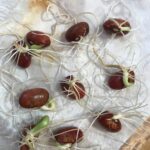
Dive deep into the world of composting, native plants and pollinators, veggie gardens, aquaponics, and more with a guided tour of our Teaching Gardens and Demonstration Site. The tour offers a look into real life applications of sustainability practices and encourages discussion, critical thinking and reflection.
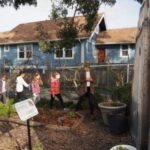
Learn the basics of successful composting, the various techniques used to compost, as well as the importance of soil to our society and the earth itself. This workshop can include a hands-on component to determine the best composting system for your class or school, or can involve troubleshooting an existing compost system.
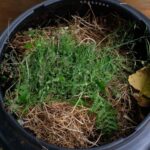
Vermicomposting is an ecosystem and composting system all in one! Alongside an intro to composting, this workshop will introduce students to the anatomy and reproduction of red wriggler worms, and the many ways to create and maintain an active composting worm bin. Dive deep into the world of worms and keep the worm bin for your classroom!

This hands-on workshop dives deeper into the compost cycle while students get their hands dirty harvesting their worm bin and finding lots of other critters along the way. End by adding your compost to the garden and discovering its benefits and/or by starting the worm bin again!
*Note: Harvest workshops should be booked around 6 months after setting up the worm bin. The contents of the bin should look like soil and be a small particle size with little newspaper.

Join us for an eye-opening microscope-based workshop, where we will examine soil on the smallest scales and observe the multitude of microbes it contains! Students will be introduced to the dynamic ecology of the soil nutrient cycle, and discuss ways we can support the vital biodiversity under our feet.
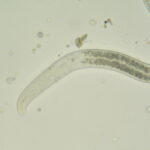
What is citizen science? How can we connect with the biodiversity in our neighborhoods? In this workshop, students will conduct a biodiversity survey near their school, and learn how to publish the data they record using the iNaturalist platform. We will discuss the importance of citizen science as a tool for deepening our understanding of the world around us, as well as connecting with other nature enthusiasts and contributing to scientific research and stewardship.

Discover the evolution of the seed, break open a seed to explore it’s anatomy and experience seed adaptations in real time. This 1 hour workshop is a combination of hands on activities, science experiments as well as a presentation packed with regionally specific information, fun facts and more. Students will walk away with a new understanding and appreciation of the amazing roles seeds play in our ecosystems.
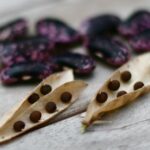
Learn undertold histories of Black, Indigenous, and People of Colour ecological stewards who have worked to increase environmental sustainability, steward their local ecosystems, and protect their lands. This educational zine comes with resources for educators and students to learn and reflect on how they can become ecological stewards in their own community.
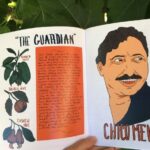
This 50-page workbook is designed to encourage students to critically engage with environmental issues. The workbook explores social systems of inequality, oppression, and green lifestyles to encourage students to think of how they might live sustainably in their communities. Students are offered optional projects on categories of land, food, and more.
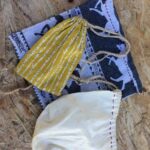
Looking for guidance on your composting system at your school or child care centre? We are happy to provide consultation to help you figure out what composting system might work best for you! Reach out to find a time for a phone call or in person visit with our educator.
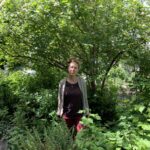
Do you have a group of educators looking to further their knowledge on how to deliver engaging environmental education? Reach out about booking a Professional Development Session. Pro-D sessions can be formatted as a run through of one of our child and youth workshops with a deeper dive into the content, or can be focused more broadly on the skills needed to deliver lessons on growing school gardens, building soil at school or more!
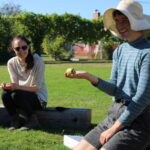
“It was very apparent that the kids, and their parents, thoroughly enjoyed the program. The day after the program I had one little guy, who attended the program, ask me to find him books on composting as his family were going to build a compost!”
“I liked how experiential the tour was for the children. The facilitator was skilled at maintaining the children’s attention and keeping them interested.”
“Elora was very interactive, engaging, and fun! She noticed when the children needed to move and was willing to respond to many questions, comments and student inquiries!”
“Jeffrey was awesome, the program was super age appropriate and fun. They absolutely LOVED it. Not sure why I haven’t done this before.”
